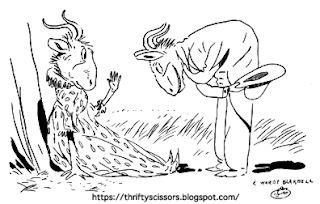The albatross is a large web-footed sea bird of which there are a number of species.
- The bill of the albatross is straight and strong, the upper mandible hooked at the point and the lower one cut off squarely.
- In color its upper parts are grayish-white and the belly white.
- It is the largest sea bird known, some measuring seventeen and a half feet from tip to tip of their expanded wings.
- The albatrosses are found at the Cape of Good Hope and in other parts of the southern seas, where they have been known to follow ships for whole days without ever resting.
- They are met at great distances from the land, where they settle down on the waves at night to sleep.
- Whenever food is abundant the birds gorge themselves to such a degree that they can neither fly nor swim.
- Their food consists of small marine animals, carrion, fish spawn, etc. Only one large egg is laid, and that is placed in a rude nest made by scraping the earth into a ridge.
- The young are entirely white and covered with beautiful woolly down.
- Sailors regard the albatross with superstition and think that to kill one brings bad luck.
- Coleridge used this belief as the foundation of his poem, The Ancient Mariner.
Learn More About The Albatross From The Web:


















































